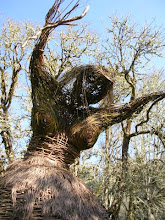Although this term sounds rather threatening, in fact it refers to a volcanic formation in India. In this case, the word comes from the Swedish trapp, meaning steps. The Deccan formation consists of layers of lava flow in huge terraces, laid down over a period of years. The jury still seems to out on the duration of this period (somewhere between 1.5 and 4 million years) but the major eruption occurred about 65 million years ago - about the time of the dinosaur extinctions. Some scientists theorize that the gases from this eruption may have contributed to that extinction, possibly in combination with a meteor strike in the Yucatan. (This combination poses an interesting scenario, which so far I haven’t seen addressed.) At any rate, it is estimated that the original flows covered up to 600,000 square miles. Today they cover about 200,000 – about the size of Oregon and Washington together. This is still one of the largest volcanic features in the world.
In a valley high in the Deccan Traps, the caves of Ajunta were discovered by a British horse officer in the 19th Century. These caves are carved out of the solid lava, with amazing statuary, including life-sized elephants, many figures of Buddha, and even a free-standing two-story temple; as well as many well-preserved frescoes. The caves were carved between the 2nd and 7th centuries A.D. – then abandoned and forgotten until their rediscovery.
Grandma’s word “traps” had nothing to do with geology or Buddist carvings. She would say “Don’t forget your traps” when you were leaving after a visit, and she was referring to your belongings – usually coat, hat, purse, whatever you had brought with you. I always assumed that it came from the word “trappings,” which it does, although both are shown as dictionary terms. We do sometimes come across “trappings” in older literature – phrases like “their elegant trappings.” The term also sometimes refers to caparisoned horses, and the word can also refer to a small horse-driven wagon. But I don’t recall ever seeing or hearing “traps” used the way Grandma did. Apparently the word – along with “trappings” – is slowly fading from use.

Me and my Grandma, Vera Green, fishing in Arizona when I was about five years old.
Frequently Grandma would say, “Company is coming, so I have to redd up the spare room.” The only other place I have heard or seen “redd” was in a book by a Scottish poet. that puzzled me, since most of Grandma’s phrases came from her Pennsylvania Dutch background. In fact, *redd* is Scottish dialect (from Old Norse rydhja) and brought to the American midlands by Scottish immigrants. “Redd up” is a particularly Pennsylvania use of the term. As a child, I was used to hearing “kaffee” for coffee, “pruins” for “prunes," and grammatical constructions such as “I’m going to take the broom out and sweep the walk around.” Mind you, Grandma spoke no German, but these inflections carried into everyday English for her family. Although her “dubishy” may have been a purely Grandma word – it meant “dubious.”

Pages from an altered book that I did, honoring my grandmother





3 comments:
Lee,this is my first visit to your blog and I am very impressed both with your writing and your knowledge and personal views. So far my favorite post is the one about your grandmother and the regional expressions she used.
Hello Lee,
My mother used this expression almost every night when she said "it's time to redd up the dishes." I don't believe I've ever come across it anywhere else. She was raised by people of German stock in Columbus Ohio so the Pennsylvania Dutch (Deutch) connection seems to fit.
Saw your link on Book-Arts-L about sacking bottoms and it led me here. Enjoyed reading some of your posts. Hope you are enjoying the calligraphy kit.
Cari
I love this post about your Grandma Lee and the altered book about her is just great.
Cin
Post a Comment